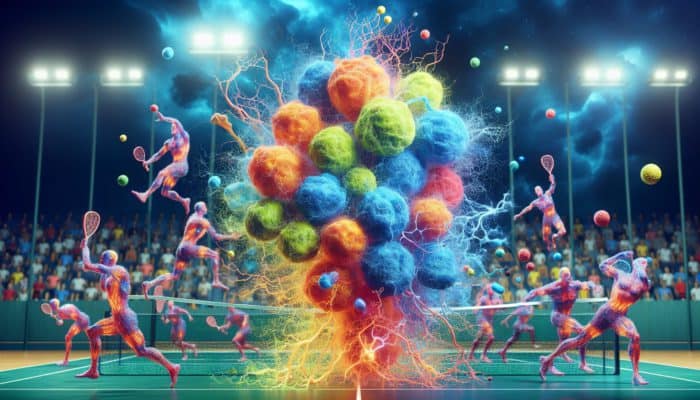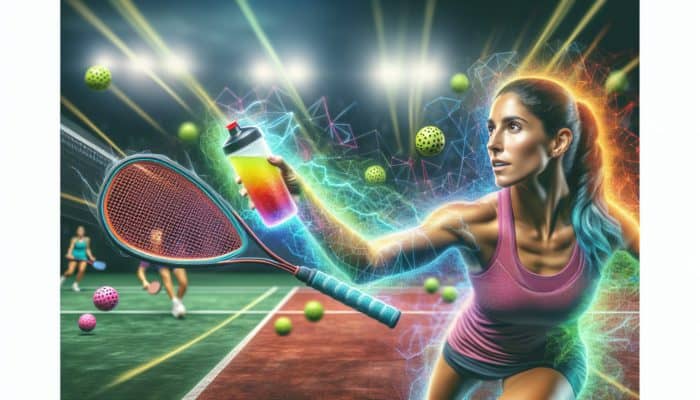Boost Your Pickleball Performance by Mastering the Essential Role of Electrolytes
Understand Why Electrolytes are Critical for Athletes’ Performance Enhancement

Electrolytes are essential minerals that acquire an electric charge when dissolved in bodily fluids. They play a pivotal role in vital physiological functions, including hydration, nerve signalling, and muscle contractions. For athletes engaged in the fast-paced sport of pickleball, maintaining an optimal level of electrolytes is essential for unlocking their complete performance potential. The primary electrolytes commonly found in sports drinks comprise:
These essential minerals are naturally present in a variety of foods and beverages; however, their concentrations can drastically decrease during high-intensity activities such as pickleball matches. Thus, having a comprehensive understanding of electrolyte management is critical for athletes striving to maintain their energy levels and optimise their performance during games.
What Are the Consequences of Electrolyte Imbalance for Pickleball Players?
In the energetic and fast-paced rallies that characterise pickleball, players frequently experience significant perspiration, leading to the loss of vital electrolytes. This depletion can negatively impact performance, resulting in symptoms such as fatigue, impaired coordination, and agonising muscle cramps. To mitigate these adverse effects, it is crucial to replenish electrolytes to sustain optimal performance throughout the game. Common signs of an electrolyte imbalance may include:
- Muscle cramps
- Fatigue and weakness
- Nausea and dizziness
- Headaches
- Confusion
By being alert to these warning signs, players can effectively restore their electrolyte levels, ultimately enhancing their performance on the court during those crucial moments of play.
What Are the Most Efficient Techniques for Monitoring Electrolyte Levels?
Monitoring electrolyte levels is imperative for athletes aiming to achieve peak performance. Players can evaluate their hydration status using various methods, such as observing the colour of their urine and recognising specific symptoms associated with electrolyte deficiencies. Here are some effective strategies to assess hydration levels:
- Urine colour: A pale yellow colour typically signifies adequate hydration.
- Thirst levels: Increased thirst often indicates that your body requires additional fluids.
- Body weight: Measuring your weight before and after exercise can provide insights into fluid loss and hydration needs.
- Physical symptoms: Be attentive to signs like fatigue, cramps, or dizziness that may suggest a need for electrolyte replenishment.
By integrating these assessment techniques into their routine, pickleball players can gain valuable insights into their hydration requirements and adjust their electrolyte intake accordingly, ensuring they perform at their peak.
Expert Insights on Effective Electrolyte Management for Optimal Pickleball Performance

What Recommendations Do Experts Have for Managing Electrolyte Intake?
Experts advocate for a balanced approach to electrolyte consumption before, during, and after pickleball sessions to ensure that players maintain optimal electrolyte levels throughout their games. Many professional pickleball athletes have devised personalised hydration strategies that highlight the importance of tailoring electrolyte intake to their individual sweat rates and environmental conditions.
By emulating the practices of elite athletes, players can benefit from experimenting with various sources of electrolytes while closely monitoring their physical responses both during and after play. Effective methods may involve consuming electrolyte-enhanced water or utilising sports gels. Notably, some professionals favour natural sources of electrolytes, such as coconut water or homemade sports drinks, which can offer comparable effectiveness to commercially available options while providing a healthier alternative.
What Are the Key Strategies for Successful Electrolyte Intake in Pickleball?
To effectively incorporate electrolytes into their pickleball routines, players should focus on the timing and selection of electrolyte-rich sources. Best practices include consuming these vital minerals at strategic moments: prior to play, during hydration breaks, and after matches. Here are actionable steps to optimise electrolyte integration:
- Pre-game: Hydrate with a well-balanced drink containing electrolytes to prepare your body for the upcoming game.
- During play: Sip on electrolyte drinks during breaks to effectively counteract sweat loss and facilitate hydration.
- Post-game: Replenish lost minerals with meals rich in electrolytes, such as bananas or yogurt, to assist in recovery.
- Adjust based on sweat rate: Players should monitor their hydration needs, particularly in hot or humid conditions, and increase their electrolyte intake as necessary.
By systematically adopting these practices, athletes can enhance their electrolyte balance more effectively, leading to improved performance on the court.
Can Sufficient Electrolyte Intake Improve Performance in Pickleball?

The impact of electrolytes on pickleball performance is substantial and should not be overlooked. Adequate consumption of electrolytes can significantly enhance endurance, mitigate fatigue, and improve muscle function—all of which are crucial components for excelling in this high-energy sport. Maintaining an appropriate electrolyte balance is vital to preventing dehydration, a key factor that contributes to fatigue and decreased performance.
By optimising their electrolyte levels, players can experience heightened energy and improved physical coordination, empowering them to uphold high-performance standards throughout their matches. Furthermore, expert analysis indicates that consistent electrolyte intake is linked to improved recovery times, allowing athletes to perform at their best across multiple games or tournaments.
Exploring Different Types of Electrolyte Supplements Available for Athletes
What Varieties of Electrolyte Supplements Are Available to Athletes?
Electrolyte supplements come in a range of forms, each tailored to meet the diverse preferences and convenience needs of pickleball players. Understanding the various types of supplements available can empower athletes to make informed choices that align with their hydration strategies. The most common forms include:
- Tablets: These portable options dissolve easily in water, making them ideal for on-the-go hydration.
- Powders: Versatile and often flavoured, these can enhance the taste of water while delivering essential electrolytes.
- Ready-to-drink beverages: Convenient options requiring no preparation, perfect for immediate use during and after matches.
- Gel packets: Compact and easy to carry, offering quick electrolyte boosts for intense gameplay.
Selecting the appropriate form of electrolyte supplementation often depends on personal taste preferences, convenience, and the specific demands of individual training regimens. Making informed decisions can lead to improved hydration practices and enhanced performance outcomes.
How Can You Determine the Most Suitable Electrolyte Supplement for Your Needs?
Choosing the ideal electrolyte supplement can be daunting given the vast array of options on the market. However, players should consider several crucial factors to identify the most appropriate choice for their individual needs. Foremost, the sodium content is essential, as it plays a significant role in fluid retention and muscle function. In addition to sodium, other necessary minerals like potassium, calcium, and magnesium should also be evaluated, as they contribute to overall muscle health and recovery.
Taste is another critical consideration; a supplement should be enjoyable to consume, as this encourages consistent intake. Players may need to experiment with different products to discover one that aligns with their taste preferences. Ultimately, recognising that what works best may vary among individuals is crucial, emphasising the need for personalisation in selecting the right electrolyte supplementation strategy.
Are There Healthy Food Sources for Electrolytes?
For those pursuing healthier alternatives to synthetic supplements, numerous natural sources of electrolytes offer essential minerals in a more wholesome form. Foods such as coconut water, bananas, and leafy greens exemplify excellent natural electrolyte sources. Coconut water, for instance, is particularly rich in potassium and serves as a refreshing hydration option. Similarly, bananas provide a potassium boost that is invaluable for muscle function, while dairy products offer a substantial source of calcium.
Additionally, sports drinks crafted from natural ingredients are gaining popularity. These options generally contain fewer additives and provide a more natural approach to replenishing lost electrolytes. By including these natural sources in their diet, pickleball players can foster better hydration practices while promoting overall health and well-being.
Strategic Hydration Approaches for Pickleball Athletes
What Is the Suggested Hydration Schedule for Pickleball Players?
Establishing a structured hydration schedule is crucial for pickleball players aiming to maintain optimal performance levels. Consuming a sufficient amount of fluids before, during, and after play is essential for staying hydrated and balancing electrolyte levels. Players should aim to drink water in the hours leading up to a match, focusing on beverages that contain electrolytes for maximum hydration benefits.
During play, it is advisable to take small sips of water or an electrolyte drink during breaks. This practice helps prevent dehydration while enabling the body to absorb fluids more effectively. Following a match, replenishing lost fluids is equally vital. Ideally, athletes should consume a combination of water and electrolyte-rich beverages to restore balance. This personalised schedule can be adjusted to meet individual needs, considering factors such as climate, intensity of play, and personal hydration practices.
How Does Proper Hydration Impact Performance in Pickleball?
Maintaining proper hydration is fundamental for optimal pickleball performance, as it directly influences energy levels, muscle function, and cognitive clarity. When players are adequately hydrated, they can sustain their energy levels, enabling longer rallies and more strategic gameplay. Conversely, even mild dehydration can have detrimental effects, such as muscle cramps, diminished endurance, and impaired concentration.
Dehydration can significantly hinder a player's ability to perform at their best, leading to slower reaction times and reduced physical capabilities. Enhancing hydration practices not only supports immediate performance but also contributes to long-term health and recovery. By acknowledging the importance of hydration, athletes can make informed choices that positively impact their performance on the court.
Should Athletes Depend Solely on Water or Include Electrolytes in Their Hydration Strategy?
While water is undeniably vital for hydration, incorporating electrolytes into the mix can greatly enhance recovery and performance, particularly during extended periods of play. The body's natural processes lead to the loss of essential electrolytes through sweat, and simply drinking water may not suffice in replenishing these lost minerals. The balance between water and electrolytes largely depends on the intensity and duration of the match.
For shorter games or practice sessions, water may be adequate. However, during longer, more intense matches, electrolyte-enhanced drinks become essential. These beverages help replace lost sodium, potassium, and other crucial minerals, supporting the body’s functions more effectively than water alone. Finding the right equilibrium between the two can significantly impact a player's performance and recovery.
Research-Supported Insights on the Advantages of Electrolytes for Pickleball Players
What Do Studies Indicate About Electrolytes and Muscle Function?
Research strongly substantiates the assertion that electrolytes are fundamental to muscle function and contraction. These minerals help maintain the proper balance of fluids within and around muscle cells, which is crucial for optimal performance. Studies indicate that when electrolyte levels are balanced, muscle contractions become more efficient, thereby reducing the likelihood of cramps and fatigue.
Moreover, ensuring adequate electrolyte intake can enhance the muscle recovery process post-exercise. When athletes sufficiently replenish electrolytes, they experience less soreness and quicker recovery times, allowing them to return to the court revitalised and prepared for the next challenge. The scientific consensus is clear: optimal muscle function heavily relies on maintaining a balanced electrolyte intake.
How Do Electrolytes Affect Endurance in Pickleball?
Electrolytes play a critical role in helping athletes sustain endurance, especially in physically demanding sports like pickleball. Sufficient electrolyte intake ensures that the body can effectively manage fluid balance, which is vital for maintaining energy levels during prolonged play sessions. Research shows that players consuming adequate electrolytes experience reduced fatigue and can perform at higher intensities for extended durations.
By optimising hydration through electrolyte supplementation, players can prolong their match durations and enhance their overall performance. This is especially significant during tournaments or competitive play, where endurance can be a decisive factor in determining the outcome of a game. Thus, prioritising electrolyte intake is essential for any dedicated pickleball athlete seeking to elevate their performance on the court.
Are There Long-Term Benefits to Regular Electrolyte Use for Athletes?
Incorporating electrolytes into a consistent fitness and hydration routine can yield substantial long-term benefits for athletes. These advantages extend beyond immediate performance improvements, contributing to better overall health, faster recovery times, and sustained athletic performance. Research suggests that athletes who routinely monitor and manage their electrolyte levels experience fewer injuries and enhanced recovery, leading to a more reliable training regimen.
Furthermore, maintaining electrolyte balance supports overall bodily functions, including muscle health and cardiovascular performance. This holistic approach ensures that athletes remain competitive and healthy over the long term, highlighting the importance of integrating electrolytes into daily routines for pickleball players at all levels.
Can Electrolytes Improve Hydration During Pickleball Matches?
Electrolytes significantly enhance the body's ability to absorb and retain fluids, which is crucial for remaining hydrated during pickleball matches. Studies indicate that electrolyte drinks can improve hydration status more effectively than water alone, particularly during extended physical activity. This becomes especially important for players involved in lengthy matches or tournaments, where maintaining proper hydration levels is critical for optimal performance.
Additionally, by promoting better fluid retention, electrolytes help alleviate the negative effects of dehydration, such as fatigue and cognitive impairment. Players who prioritise hydration and electrolyte intake can expect improved performance on the court, emphasising the undeniable connection between hydration and athletic success in pickleball.
Common Myths About Electrolytes in Sports Nutrition
Do All Sports Drinks Contain Electrolytes?
Not all sports drinks are created equal; not every sports drink contains electrolytes. While many are marketed as hydration solutions, some merely function as flavoured water with minimal or no added minerals. Athletes must scrutinise labels to differentiate between products that genuinely offer electrolyte benefits and those that do not. Additionally, some beverages may contain excessive sugars and artificial ingredients, which can detract from their overall effectiveness.
Understanding the composition of these drinks enables players to make informed choices regarding their hydration strategies. Opting for drinks specifically formulated to replenish electrolytes is vital for maintaining performance on the court.
Can Excessive Electrolyte Intake Be Harmful?
Indeed, excessive electrolyte intake can pose health risks, potentially resulting in conditions such as hypernatremia, characterised by elevated sodium levels in the blood. This imbalance can cause serious health complications like high blood pressure, swelling, and other related issues. Moderation is essential; players should adhere to recommended guidelines for electrolyte intake based on their activity level, environmental conditions, and individual health considerations.
Consulting with a healthcare provider or a sports nutritionist can assist athletes in implementing a safe and effective approach to electrolyte supplementation, maximising performance benefits while minimising risks.
Is Daily Electrolyte Supplementation Necessary for Everyone?
Daily electrolyte intake is not universally required for all individuals. The necessity for electrolytes largely depends on factors such as activity level, dietary habits, and specific health needs. For instance, individuals engaged in regular intense physical activity, like pickleball players, may benefit from more frequent electrolyte consumption, while those with a sedentary lifestyle may not require additional supplementation.
Understanding personal hydration needs and consulting with healthcare professionals can help individuals determine the most effective electrolyte intake strategy tailored to their lifestyle and activity levels.
Are Electrolytes Only Important for Athletes?
Electrolytes are essential for everyone, not just athletes. They play crucial roles in maintaining vital bodily functions, including hydration, nerve signalling, and muscle contractions. Regardless of physical activity levels, individuals need a well-balanced intake of electrolytes to support overall health. This is particularly critical in situations like hot weather, illness, or dehydration, where electrolyte levels can become imbalanced.
Recognising the importance of electrolytes across various lifestyles promotes more comprehensive health practices, emphasising their significance beyond mere athletic performance.
Can You Meet Your Electrolyte Needs Through Food Alone?
Yes, electrolytes can be effectively replenished through dietary choices. Foods rich in essential minerals, such as bananas for potassium, dairy products for calcium, and table salt for sodium, contribute to maintaining healthy electrolyte levels. A balanced diet incorporating a variety of fruits and vegetables can provide the necessary minerals without relying solely on supplements.
Integrating these nutrient-dense foods into daily routines allows individuals, including pickleball players, to sustain a healthy electrolyte balance while promoting overall nutrition and wellness.
Practical Tips for Maintaining Electrolyte Balance in Pickleball
How to Easily Integrate Electrolytes Into Your Daily Diet
Incorporating electrolytes into your diet can be effortlessly achieved by making mindful food choices. Players should prioritise foods that are naturally rich in essential minerals. For instance, bananas, renowned for their high potassium content, make a convenient snack option before or after games. Dairy products, such as yogurt and milk, serve as excellent sources of calcium, while nuts and seeds provide magnesium, all of which are important for maintaining electrolyte balance.
Moreover, utilising electrolyte-rich sports drinks or natural alternatives, such as coconut water, can further support hydration efforts during and after play. By planning meals and snacks around these electrolyte-rich options, pickleball players can effectively support their hydration needs and overall health.
What Are the Key Signs of Electrolyte Imbalance to Monitor?
Recognising the symptoms of electrolyte imbalance is crucial for maintaining optimal health and performance. Symptoms may manifest in various forms, such as muscle cramps, fatigue, headaches, and dizziness. These indicators serve as important signals that the body may be lacking essential minerals. Identifying these symptoms early empowers players to adjust their hydration and nutrition strategies promptly.
Furthermore, players should remain vigilant about their physical well-being, particularly during intense training sessions or in hot weather conditions. By proactively monitoring for these signs, athletes can take corrective action to restore balance and maintain peak performance on the court.
How to Tailor Electrolyte Intake Based on Play Intensity?
Adapting electrolyte intake according to the intensity of play is vital for optimising both hydration and performance. During intense gameplay, players should increase their electrolyte consumption to counteract the greater loss of minerals through sweat. This adjustment may involve consuming more electrolyte-enhanced beverages or additional snacks rich in essential minerals before and during matches.
Conversely, during lighter practice sessions, players may require less electrolyte intake and can primarily rely on water for hydration. Monitoring sweat rates and the duration of play can help guide these adjustments, ensuring that athletes effectively meet their unique hydration needs.
How to Effectively Monitor Electrolyte Levels at Home?
Monitoring electrolyte levels at home can be achieved through simple yet effective methods. Players can use test strips or devices designed to measure hydration status in urine or sweat. Regular assessments can help individuals maintain their electrolyte balance and prevent potential health issues associated with imbalances.
Additionally, tracking dietary intake can provide insights into mineral consumption, enabling players to make informed decisions regarding their hydration strategies. By adopting these monitoring practices, pickleball athletes can better manage their electrolyte levels and enhance their performance on the court.
Frequently Asked Questions Regarding Electrolytes and Performance
Which Electrolytes Are Most Crucial for Athletes' Performance?
The key electrolytes essential for athletes include sodium, potassium, calcium, magnesium, chloride, and bicarbonate. These minerals are crucial for maintaining fluid balance, supporting muscle function, and enhancing overall athletic performance.
How Can I Identify Signs of Dehydration?
Signs of dehydration can manifest as increased thirst, dry mouth, fatigue, dark urine, and dizziness. Monitoring these symptoms helps you stay aware of your hydration status, allowing for timely interventions.
Can I Obtain Electrolytes from Food Sources?
Absolutely! Numerous foods are rich in electrolytes. For instance, bananas are an excellent source of potassium, dairy products provide calcium, and nuts are great sources of magnesium.
Are Sports Drinks Necessary for Pickleball Players?
While not strictly necessary, sports drinks can effectively replenish lost electrolytes during intense play, thereby enhancing performance and recovery for pickleball players.
How Much Water Should I Consume Before a Game?
It is advisable to drink at least 16-20 ounces of water approximately 2-3 hours before a game, with additional hydration closer to the start time to ensure optimal performance.
What Is the Best Hydration Strategy During a Match?
During matches, it is recommended to sip on electrolyte drinks or water during breaks to maintain hydration levels without experiencing bloating, ensuring you remain focused and ready to play.
Is Daily Electrolyte Supplementation Necessary for Everyone?
Daily supplementation is not required for everyone; it largely depends on your activity level and dietary intake. Athletes may need to consume more electrolytes during training and competition periods.
Can I Depend Only on Water During Extended Matches?
While water is essential for hydration, relying solely on it during lengthy matches may not adequately restore lost electrolytes, making electrolyte drinks beneficial for optimal performance.
What Should I Do If I Experience Muscle Cramps?
If muscle cramps occur, it is crucial to hydrate with electrolytes, stretch the affected muscle, and rest. If cramps persist, consult a healthcare professional for further guidance.
How Can I Naturally Improve My Electrolyte Balance?
To enhance your electrolyte balance naturally, incorporate electrolyte-rich foods into your diet, stay hydrated with water and natural sports drinks, and monitor your activity levels to adjust intake as needed.
Connect with us on Facebook!
The Article Electrolytes for Pickleball Players: Essential Hydration Guide appeared first on https://athleticsupplement.com
The Article Electrolytes Guide for Essential Hydration in Pickleball Players Was Found On https://limitsofstrategy.com
The Article Electrolytes for Essential Hydration in Pickleball Players found first on https://electroquench.com

